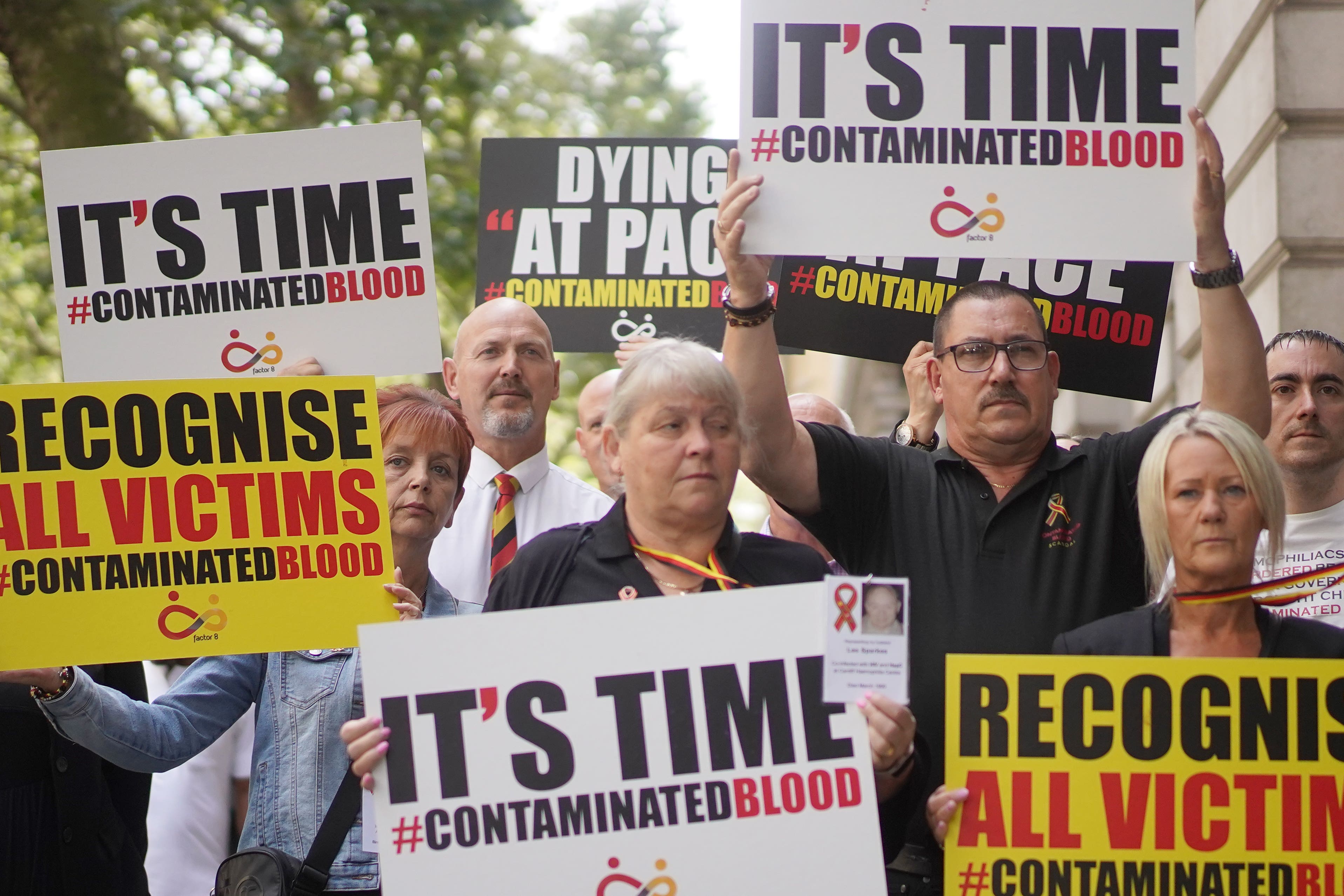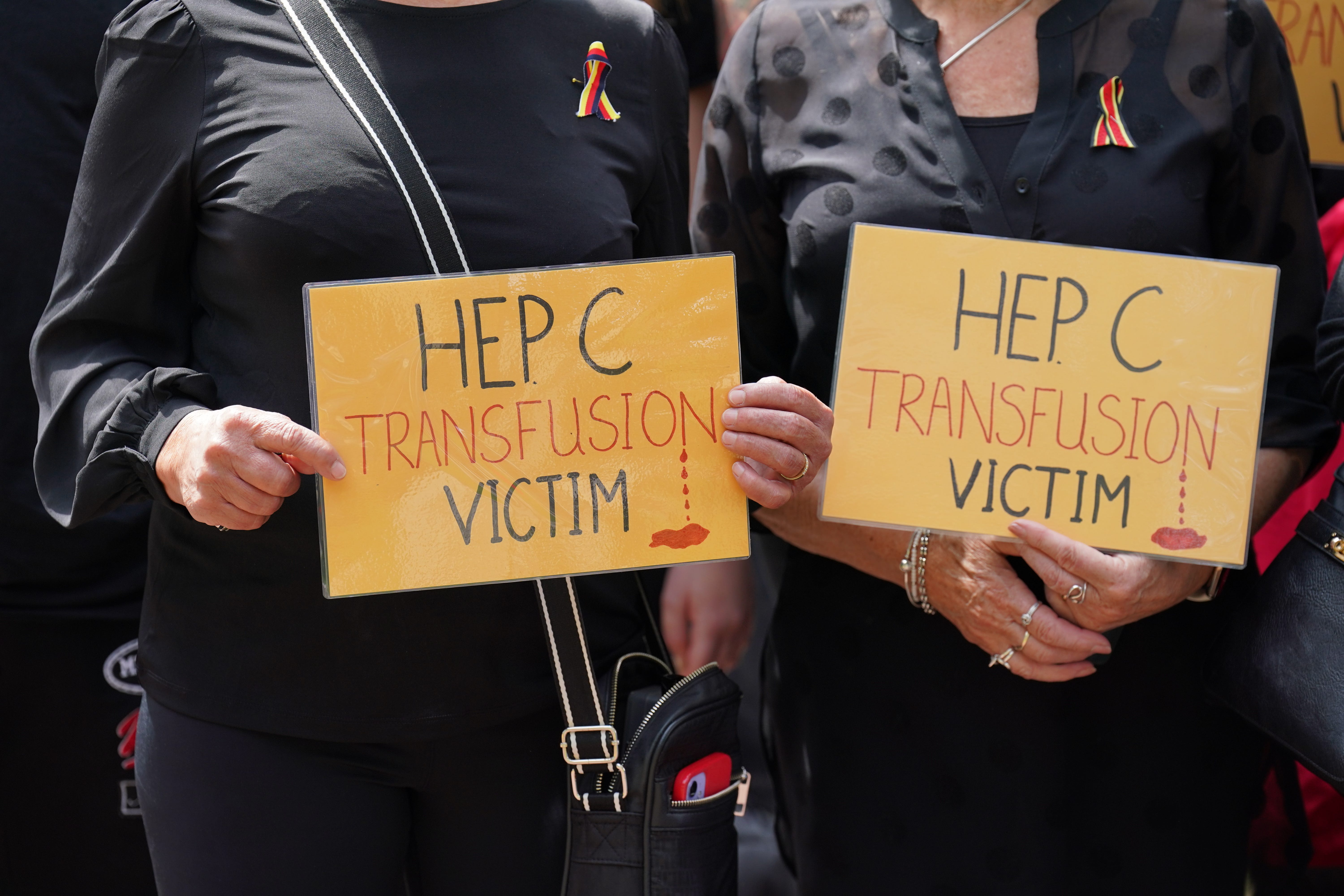Women who met through infected blood inquiry say it was ‘magical relief’ to find each other
Blood scandal concerns over 30,000 people in UK, all infected with deadly viruses in ‘70s and ‘80s due to contaminated blood products
Three women who were infected by contaminated blood products have spoken about the “magical” relief of meeting each other through the Infected Blood Inquiry and learning that they were not alone in their health struggles.
Sue Wathen, Joan Edgington and Nicola Leahey, who all met through the inquiry, found out they were all infected with hepatitis C.
The infected blood scandal concerns over 30,000 people in the UK who were infected with deadly viruses during the 1970s and 1980s due to contaminated blood products.
The latest evidence submitted to the inquiry suggests that nearly 2,000 of victims are living with undetected hepatitus C as a result of the scandal. The far-reaching inquiry, formed in 2017, will determine where responsility lies with the scandal, amid allegations of a decades long cover-up by the NHS.
Ms Wathen, from Northamptonshire, was diagnosed with hepatitis C in 2014 and does not know when she was infected, explaining that her blood records “disappeared” leaving a singular reference in a note in her medical files which stated she had had “numerous blood transfusions”.
Ms Edgington, of Somerset, was infected in January 1991 after receiving a blood transfusion during surgery and was diagnosed a few years later.
Ms Leahey, of Lancashire, had blood transfusions in 1975 and 1980 from which, she found out following tests in 2009, she had contracted hepatitis C.

The three women, who are now part of a group that call themselves the “blood friends” talked about how unwell they had been in the years between infection and treatment, and in some instances during treatment and afterwards.
“You are on your own when you’re diagnosed and then suddenly the whole world opens up to you, that actually you’re not the only one, and there’s hundreds of thousands of others out there,” Ms Leahey told PA .
One of Ms Wathen’s friends labelled her as “sickly” as she had been “unwell for years” before she was diagnosed.
Ms Edgington spoke of going down with “chronic fatigue” before she was tested for hepatitis C, and of being left with health issues springing from a medical trial of what she termed “extremely harsh chemotherapy” – which is no longer used to treat the condition and which she said she “just survived”.
Ms Leahey said she took early retirement because she constantly felt “extremely tired” in the years before the infection was discovered.
She told of how the exhaustion continued as she underwent treatment, detailing going from being an “active” person to “being in bed for half the week in a black room”.
The group described meeting each other, and others infected and affected, as “wonderful”.
“Because you are on your own when you’re diagnosed and then suddenly the whole world opens up to you, that actually you’re not the only one, and there’s hundreds, thousands of others out there,” Ms Leahey told PA.
“It’s just that support, it’s that knowledge that we can just speak to somebody and they know how we feel – the desperation.

“There’s the good and there’s the bad, there’s the positive moments to share, you know, we’ll talk about the grandchildren and things like that, but we’ll also be there for each other to know exactly, when you’ve got a bad day and you’re feeling completely zonked out, the negative thoughts, the worry that what is next, you know, are we going to be the next statistic and not be at the next meeting.
“And it’s that insecurity, but being together as a group, we’ve got that security.
“To plug into a group of people who totally got your story, who knew what you were dealing with on a day to day basis, who could share articles with you that you could take to your GP, who could tell you about networks and other groups, I can’t tell you the relief,” said Ms Edgington.
“We all say, we wouldn’t be here as strong if we weren’t all together.
“We call ourselves blood friends.”
There are eight of them in total who have “stuck together” and keep in regular contact.
Ms Edgington said: “I was there at the opening of the inquiry and I went as an individual on my own and just sat in this wonderful auditorium, it was a fabulous space, and I couldn’t believe that all those people there had the same story.
“And it was overwhelming…just to know you weren’t alone.
“They had very kindly put in some Red Cross people. I think I worked my way through a box of tissues and I kept saying to her: ‘I’m not sad I am just relieved’.”
She went on to say “it was the validation” of sharing similar experiences of medical battles that at points seemed inexplicable.
“So where we had maybe begun to feel like we were hypochondriacs, that we were wasting the doctors’ time, that the random blood tests were just an anomaly, no they weren’t,” she said.

“They were all part of the pattern. So that was just a real personal impact that day, it took me about a fortnight to process it.
“And we’ve had telephone numbers swapping and emails, and then to plug into a group of people who totally got your story, who knew what you were dealing with on a day-to-day basis, who could share articles with you that you could take to your GP, who could tell you about networks and other groups, I can’t tell you the relief.”
Ms Wathen also attended the opening of the inquiry on her own.
“I do think it was quite staggering, that suddenly there were all these other people, and you thought, these are people who have a story,” she told PA.
“And I think it put my own story into perspective.”
Bookmark popover
Removed from bookmarks